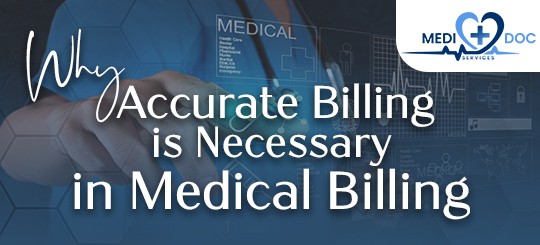
Why Accurate Billing is Necessary in Medical Billing
In the healthcare industry, accurate medical billing is a cornerstone of both financial and operational success. Medical billing involves translating healthcare services into codes that insurance companies, patients, and healthcare providers use for reimbursement. Mistakes in this process can lead to delayed payments, financial losses, compliance issues, and strained relationships with patients and insurers. Here’s why ensuring accuracy in medical billing is crucial:
1. Ensures Timely Reimbursement
Accurate billing is essential for healthcare providers to receive timely reimbursement for the services they provide. When a bill is coded correctly, insurance companies can process it quickly, reducing the chances of delayed payments. Errors in billing can result in claims being rejected, returned for corrections, or flagged for audits, all of which can significantly delay reimbursement. For medical practices and hospitals, timely payments are critical to maintaining smooth operations and covering expenses.
2. Reduces the Risk of Denied Claims
One of the most common consequences of inaccurate medical billing is the denial of claims. Insurance companies have strict guidelines and criteria that claims must meet to be approved. If there are errors in diagnosis codes, procedure codes, or patient information, the insurance company may reject the claim. In some cases, denied claims can be complex to reprocess and may result in significant delays in payment or loss of revenue. Ensuring that all codes and information are correct from the outset is essential to avoid these issues.
3. Prevents Financial Loss
Inaccurate billing can lead to significant financial losses for healthcare providers. When claims are under-coded or over-coded, there may be a loss in reimbursement revenue. Under-coding may result in the provider being paid less than they deserve, while over-coding could lead to audits, fines, and legal penalties. Both under-coding and over-coding are harmful to the financial health of medical practices and can compromise patient care if not corrected.
4. Improves Patient Satisfaction
Patients rely on accurate billing to ensure they are billed correctly for the services they receive. Mistakes in their bills, such as incorrect charges or coding, can lead to confusion, frustration, and a lack of trust in the healthcare provider. By providing clear, accurate bills, healthcare organizations foster better patient relationships and improve satisfaction levels. Patients are less likely to dispute charges if they feel confident in the accuracy of their bill.
5. Promotes Efficient Operations
Accurate billing helps streamline the overall operations of a medical practice or healthcare facility. When claims are correctly coded and processed the first time, it reduces administrative burden, allowing staff to focus on other important tasks. This efficiency improves the workflow, reduces stress among staff, and minimizes the need for follow-up with patients and insurers.
6. Reduces the Risk of Fraud
Inaccurate billing, whether intentional or accidental, can increase the risk of fraud in the healthcare system. Overbilling, double billing, or submitting false claims can have severe consequences, both legally and financially. An intentional misrepresentation of services can lead to criminal charges and significant penalties. Inaccurate billing due to negligence or lack of knowledge, however, still leaves healthcare providers vulnerable to audits, fines, and loss of credibility. By prioritizing accuracy in medical billing, providers can ensure they are in compliance with both ethical standards and legal requirements.
7. Maintains a Good Reputation
A healthcare organization’s reputation is invaluable. Errors in billing can reflect poorly on a healthcare provider’s professionalism and attention to detail. Inaccurate or fraudulent billing can damage the trust that patients, insurance companies, and other stakeholders have in the provider. On the other hand, consistently accurate billing helps maintain a positive reputation, fosters trust, and enhances the overall brand of the medical practice or facility.
8. Supports Proper Coding for Better Care
Accurate billing goes hand-in-hand with proper medical coding, which is essential for patient care. The coding process involves translating a patient’s diagnosis and the procedures performed into standardized codes. These codes are used for statistical analysis, medical research, and determining treatment outcomes. Accurate coding allows healthcare providers to understand patient needs better and track trends in patient care. Mistakes in coding can lead to misinterpretations of patient data, which in turn can affect treatment plans and clinical decisions.
Conclusion
Accurate medical billing is not just about ensuring financial health; it is about building trust, maintaining compliance, and providing the highest quality of care to patients. By minimizing billing errors, healthcare providers can avoid costly denials, enhance cash flow, and ensure they are reimbursed properly for the services they render. Most importantly, accurate billing fosters transparency and professionalism in an industry where both are crucial to success.

